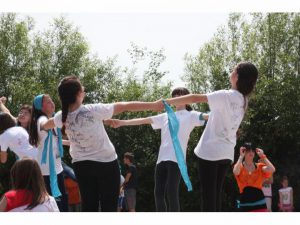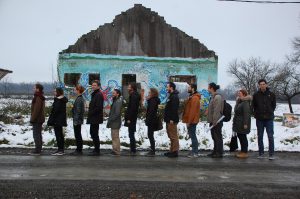Most Mira
Mixed arts: Bosnia


Most Mira (Bridge of Peace) was founded in 2008 ‘to build a better, more peaceful future for the young people of Prijedor and the surrounding areas’ by ‘bringing young people to make friends across ethnicities and celebrate diversity’[1]. Kemal Pervanic, one of Most Mira’s founding trustees, was born in Preijedor which was amongst the most severely affected regions during the Bosnian war. A survivor of the notorious Omarska concentration camp he came to the UK as a refugee and has since dedicated his work to reconciliation and peace-building[2]. Pervanic believes that the new generations of Bosnians who have nothing to do with the war are its greatest victims because their parents, teachers and community leaders are transferring the legacy of previous wars to them. He wanted to do something to help young people to ‘escape from this trap’[3]. Although not from an arts background himself Pervanic saw that the arts provided a safe, common and neutral space for people from all sides to come together, to push boundaries and create something unrelated to conflict.
In its first three years Most Mira ran a week long annual arts festival for 300-450 children from all ethnic backgrounds from 4 segregated schools and 2 youth groups. The festival was co-ordinated and run by a large group of local and international volunteers and artists who ran participatory workshops in art, drama, dance, music, circus skills, photography and media. Since 2012, they have worked with school children on drama projects lasting 6-9 months that culminate in performances in the local theatre and in each other’s schools. In the last couple of years, leadership and democracy workshops and training have also been run for young people in Preijedor. Most Mira have been invited to establish a permanent Peace Centre in Kevljani and an architecture workshop resulted in a design that received planning approval in March 2016. Funds are now being raised to build the Centre.
When Most Mira was first being established, Pervanic describes that there was a lot of resistance from the communities but that he was lucky that two teachers from the key schools were supportive and crucial to making the project happen. ‘I never said (to them) it was about reconciliation but they both understood that it was’. He avoided using the word reconciliation, which is a highly politicised term in the communities where Most Mira works. “It was too sensitive to talk about making peace and reconciling. People were so badly conditioned that they felt safer in their own group. Trying to reach out to people from another group involved a lot of hostility… People are afraid of making peace”. In this highly divisive and politicised environment Most Mira make sure that their activities are dissociated from politics. The focus on artistic expression enables children to build friendships and trust across ethnicities.
Participatory approaches and learning are central to Most Mira’s approach and stand in direct contrast to the rigid, traditional education models used in most Bosnian classrooms. International volunteers (many from the UK) have also been important to Most Mira’s activities. The trustees argue that volunteers bring new ideas and energy and are not restricted or burdened by local politics. They point out many participate because of the novelty of the international volunteers. They draw people in who might otherwise have stayed at home and push them beyond their comfort zone and to try something new[4].
Over the years Pervanic has seen many positive changes, ‘Ten years ago you wouldn’t have seen people from the community come together to watch a performance in the same theatre. Now they are there together and they get on really well with each other’. He highlights various ripple effects that he attributes to Most Mira’s work: a number of young people going on to work in the arts and other small arts and youth initiatives springing up. At the same time he stresses how tough the work is. When funders ask him how he will know if their work will make a difference he wants to answer, “I don’t know. I will know in 10 or 15 years time”. However most funders are not willing to wait that long. With an emphasis on short-term results and immediate solutions, Most Mira have found that long term community based, participatory arts work is not of interest to the majority funders.
“You can start this process (of reconciliation) and you can run it successfully without talking about it, without using this specific term. You can talk about it using other words. Some people have been able to see this kind of participatory arts work is crucial if we want to grow a long-term peace”[5] Kemal Pervanic, founding trustee, Most Mira
[1] Quotes taken from the website: http://www.mostmiraproject.org/
[2] Kemal Pervanic wrote a book about his experience during the war, The Killing Days: My journey through the Bosnian War (1999)
[3] these quotes are taken from an interview with Kemal Pervanic carried out for this research, 29th December 2017
[4] See Creative Commons: Engaging Youth in Peacebuilding through Art in Bosnia and Herzegovina: a report by Most Mira – Humanity in Action International Exchange 2013, p10. Available here: http://docs.wixstatic.com/ugd/9c2f51_dbf765189ec34f1cbc540170abae6dc9.pdf
[5] quote taken from interview with Kemal Pervanic undertaken for this research, 29th December 2017.
